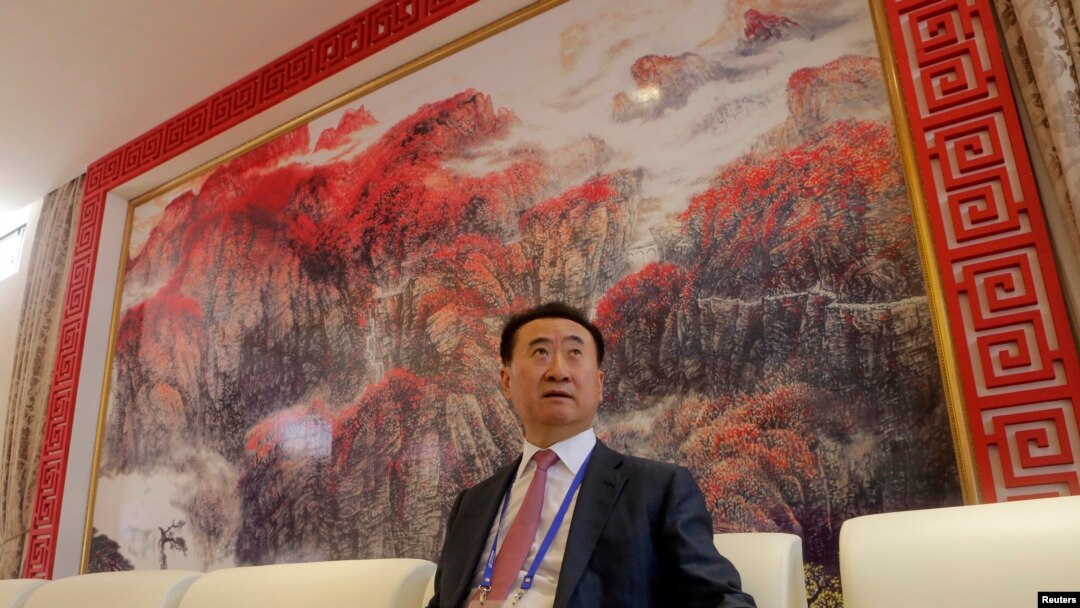QINGDAO, CHINA —
China's richest man, property developer Wang Jianlin, raised the curtain on a planned 50 billion yuan ($8.17 billion) “motion-picture city” which he described as the biggest-ever single investment in the movie and television industry.
Property developer Wang Jianlin, 58, founder of Dalian Wanda Group, was surrounded by Hollywood stars John Travolta, Nicole Kidman and Catherine Zeta-Jones on Sunday as he launched his most ambitious project yet in the picturesque coastal city of Qingdao.
When completed in 2017, the Oriental Movie Metropolis will boast 20 sound stages, including the world's first underwater studio, a massive convention and exhibition complex, a sprawling shopping mall with an indoor amusement park and seven resort hotels.
The project also will include a yacht club with 300 berths.
"Major step" for China
“The Oriental Movie Metropolis is a major step in China's strategy to become a global cultural powerhouse,” Wang said.
It was not only crucial to the development of Wanda's entertainment business, he added, but also an important step for building China's cultural brand.

Wanda Group, which is privately held, has invested in 72 Wanda Plazas across China, along with 40 five-star hotels. The company also owns 6,000 movie screens, 62 department stores and 68 karaoke centers.
More recently, the company has turned to offshore markets to expand its real estate and leisure investment. Last year, Wanda closed its $2.6 billion buy-out of U.S. cinema chain AMC Entertainment. Wang this year also announced a 1 billion pound ($1.57 billion) British investment that included the purchase of Sunseeker, Britain's largest luxury yacht maker by sales.
The Wanda chairman told Reuters earlier this month that he could afford to spend as much as $5 billion every year to buy foreign firms or assets.
Wanda Group’s ambitious plans
In an interview on the sidelines of Sunday's ceremony, Wang said that he expected Wanda Group revenue to increase to $30 billion this year, and to continue to increase by $10 billion every year.
Wanda Group says it has total assets of 300 billion yuan ($49.01 billion) and annual revenue for 2012 of 141.7 billion yuan ($23.15 billion).
“We will have more than $50 billion in revenue two years from now,” he said. “In 2020, we will have at least $100 billion, even by conservative estimates.”
Offshore hotel investment is a major focus of the company's strategy. “In the next eight to ten years, we will build high-end hotels in major cities around the world,” he said.
To reach the site of Oriental Movie Metropolis, which is planned as a 376-hectare, eight-phase development, it's necessary to drive about one hour from downtown Qingdao past rows of upscale apartment complexes that appear partially occupied.
Wang, who started his own film production company in recent months that has met with mixed success, explained that movies were a “sunrise industry” in China. He expects Wanda to be among the world's leading 20 entertainment companies by 2016.
He declined to discuss financing for the new project, although he has not ruled out the use of partners or of debt.
Property developer Wang Jianlin, 58, founder of Dalian Wanda Group, was surrounded by Hollywood stars John Travolta, Nicole Kidman and Catherine Zeta-Jones on Sunday as he launched his most ambitious project yet in the picturesque coastal city of Qingdao.
When completed in 2017, the Oriental Movie Metropolis will boast 20 sound stages, including the world's first underwater studio, a massive convention and exhibition complex, a sprawling shopping mall with an indoor amusement park and seven resort hotels.
The project also will include a yacht club with 300 berths.
"Major step" for China
“The Oriental Movie Metropolis is a major step in China's strategy to become a global cultural powerhouse,” Wang said.
It was not only crucial to the development of Wanda's entertainment business, he added, but also an important step for building China's cultural brand.

Wang Jianlin, chairman of Chinese property developer Dalian Wanda Group, sits in a meeting room as he arrives for the launch ceremony for the Qingdao Oriental Movie Metropolis on the outskirts of Qingdao September 22, 2013.
For Wang, who was named by Forbes as China's richest man with personal wealth of $14 billion, the Qingdao project also represents the latest move by Wanda Group to parlay its real estate and shopping mall development into a leisure and entertainment empire.Wanda Group, which is privately held, has invested in 72 Wanda Plazas across China, along with 40 five-star hotels. The company also owns 6,000 movie screens, 62 department stores and 68 karaoke centers.
More recently, the company has turned to offshore markets to expand its real estate and leisure investment. Last year, Wanda closed its $2.6 billion buy-out of U.S. cinema chain AMC Entertainment. Wang this year also announced a 1 billion pound ($1.57 billion) British investment that included the purchase of Sunseeker, Britain's largest luxury yacht maker by sales.
The Wanda chairman told Reuters earlier this month that he could afford to spend as much as $5 billion every year to buy foreign firms or assets.
Wanda Group’s ambitious plans
In an interview on the sidelines of Sunday's ceremony, Wang said that he expected Wanda Group revenue to increase to $30 billion this year, and to continue to increase by $10 billion every year.
Wanda Group says it has total assets of 300 billion yuan ($49.01 billion) and annual revenue for 2012 of 141.7 billion yuan ($23.15 billion).
“We will have more than $50 billion in revenue two years from now,” he said. “In 2020, we will have at least $100 billion, even by conservative estimates.”
Offshore hotel investment is a major focus of the company's strategy. “In the next eight to ten years, we will build high-end hotels in major cities around the world,” he said.
To reach the site of Oriental Movie Metropolis, which is planned as a 376-hectare, eight-phase development, it's necessary to drive about one hour from downtown Qingdao past rows of upscale apartment complexes that appear partially occupied.
Wang, who started his own film production company in recent months that has met with mixed success, explained that movies were a “sunrise industry” in China. He expects Wanda to be among the world's leading 20 entertainment companies by 2016.
He declined to discuss financing for the new project, although he has not ruled out the use of partners or of debt.


